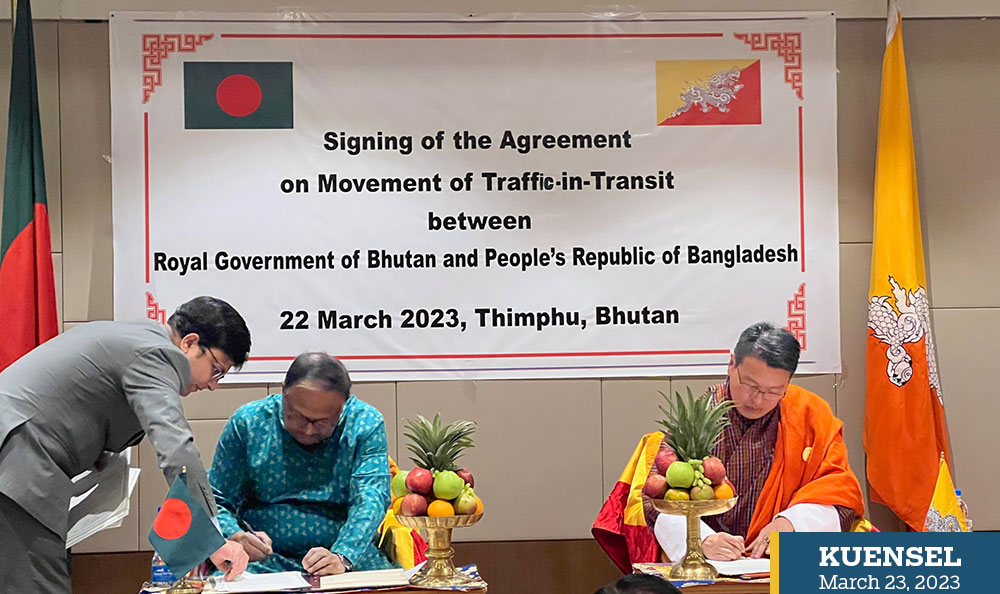Rinzin Wangchuk
Bhutan and the People’s Republic of Bangladesh marked another milestone in the history of bilateral relations with the signing of an agreement on the movement of traffic-in-transit and its protocol between the countries.
Industry, Commerce and Employment Minister Karma Dorji and the visiting Commerce Minister of Bangladesh, Tipu Munshi signed the agreement in Thimphu yesterday.
The agreement provides Bhutan with greater connectivity with necessary transit facilities for movement of goods using multimodel transport arrangements.
According to officials from Department of Trade, Ministry of Industry, Commerce and Employment (MoICE), the transit agreement will facilitate the movement of goods for both export and import through the seaports of Mongla, Payra and Chattogram in Bangladesh.
Lyonpo Karma Dorji said that the agreement would not only contribute to further deepening of bilateral trade and economic relations but will benefit the country’s private sector greatly.
“Bhutan is very fortunate to have a friendly neighbour like Bangladesh and we are very thankful to the government and the people of Bangladesh for the generous act of offering us transit facility and greater connectivity with and through Bangladesh, by all modes of transport,” he said.
Commerce Minister Tipu Munshi said that Bangladesh is always a proponent of regional connectivity which ensures the free movement of goods and services.
Talking about the multifold benefits of connectivity, he said that it ensures better communication among traders and investors which amplifies trade, ensures speed of transactions, maintains smooth supply chain connectivity and facilitates market access.
“With an Internet connection or online marketplace, traders can extend their reach to global markets. Digital connectivity helps to store and manage data easily and thus minimise trade cost,” Tipu Munshi said.
Background on Transit Agreement
MoICE secretary Tashi Wangmo said that the first transit agreement (TA) between Bhutan and Bangladesh was signed in 1980 in Thimphu with a validity of 10 years. The agreement expired in 2000 after automatic extension for another 10 years. “Since then, both countries have, on several occasions, exchanged our interests and desire to establish a fresh TA,” she said.
The two governments initiated the TA in 2015 during the fifth Commerce Secretary Level Meeting (CSLM) held in Bangladesh and both sides agreed to form a Joint Working Group (JWG) to work on the new agreement following the formation of JWG in 2017, according to the MoICE secretary.
It took only three rounds of meetings to finalize the new agreement and its protocols. “Had it not been for the pandemic, the agreement would have been signed by 2020,” she said.
The outcome of the JWG was submitted to the 8th CSLM in September 2022 in Dhaka, where the agreement and its protocols were both endorsed for signing by commerce ministers of the two countries.
On the trade and economic front, Lyonpo Karma Dorji said that the signing of the TA in 1980 and its protocol in 1984 opened up business opportunities for the people of the two countries.
“Today, besides being a close neighbour, Bangladesh is an important trading partner for Bhutan and continues to remain our second largest export market,” Lyonpo said, adding that trade between the two countries has been growing steadily both in terms of value and volume over the years.
However, in 2022, Bhutan’s total trade recorded a drop by USD 10 million (M) from USD 72M in 2021. “This is attributed to a fall in exports by 10 percent while the imports from Bangladesh have increased by 14 percent compared to 2021,” Lyonpo Karma Dorji said.
Trade potential
The bilateral trade agreement has been serving as the framework for the conduct of trade and commerce between the two countries and has been beneficial for both countries. “The Preferential Trading Agreement (PTA) that came into force from July 2022 has further transformed our trading arrangement to a more liberal one with duty-free market access provided for more products for exports from both the countries,” Lyonpo said.
Bangladeshi commerce minister said that the trade and investment relations between the two countries are growing steadily and Bangladesh is committed to expanding cooperation and partnership further.
The total trade between Bangladesh and Bhutan stood at USD 45.06M in 2021-22, with Bangladesh exporting pharmaceuticals, ceramics, garments, and food items while Bhutan exports mainly calcium carbide, cement, and ferrosilicon.
“We believe there is immense potential for increasing trade volumes, and that’s why we have concluded the transit agreement as a gesture of our willingness to enhance the regional value chain in this location,” Tipu Munshi said.
Bangladesh values bilateral relations with Bhutan and attaches great importance to the socioeconomic progress and development of the Kingdom.
“We signed the PTA in 2020 and the transit agreement today,” he said. “And we are hopeful to sign a Memorandum of Understanding (MoU) on cooperation in the field of power trade between Bangladesh and Bhutan in May this year.”
The commerce minister added that connectivity and transit facilities between the two countries could contribute to economic growth and development.
“Like previous years Bhutan can support us in all regional and multilateral forums and be part of our development partner in our trillion-dollar journey by cooperation in hydroelectricity generation,” he said.
He also said that Bangladesh is keen to deepen the tourism ties between the two nations. Bangladesh offers a unique travel experience, with its beautiful natural landscapes, historic landmarks, and cultural diversity.
“We have made the visa process easier for tourists,” Tipu Munshi said, adding that Bangladesh expects Bhutan to consider withdrawing the Sustainable Development Fee (SDF) from Bangladeshi visitors so that many Bangladeshi could visit Bhutan and contribute to its economy.
Minister of Energy and Natural Resources, Lyonpo Loknath Sharma, Ambassador of Bangladesh to Bhutan, secretaries, heads of relevant departments, president of Bhutan Chamber of Commerce & Industry and other senior officials from Bangladesh and Bhutan also attended the agreement signing.


